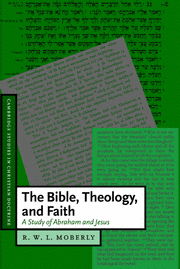Book contents
- Frontmatter
- Contents
- Preface
- 1 The Bible, the question of God, and Christian faith
- 2 Christ as the key to scripture: the journey to Emmaus
- 3 Abraham and God in Genesis 22
- 4 Ancient and modern interpretations of Genesis 22
- 5 Genesis 22 and the hermeneutics of suspicion
- 6 Jesus in Matthew's Gospel as Son of God
- 7 Summary and prospect
- References
- Index of scriptural references
- Index of names
- Index of subjects
7 - Summary and prospect
Published online by Cambridge University Press: 02 December 2009
- Frontmatter
- Contents
- Preface
- 1 The Bible, the question of God, and Christian faith
- 2 Christ as the key to scripture: the journey to Emmaus
- 3 Abraham and God in Genesis 22
- 4 Ancient and modern interpretations of Genesis 22
- 5 Genesis 22 and the hermeneutics of suspicion
- 6 Jesus in Matthew's Gospel as Son of God
- 7 Summary and prospect
- References
- Index of scriptural references
- Index of names
- Index of subjects
Summary
Our final task is twofold. On the one hand, it is necessary to give a summary account of my thesis as a whole, to draw together the threads of the previous argument, and to show how the exegesis of Genesis 22 and Matthew's Gospel illustrates the wider thesis about biblical interpretation in relation to faith in God, as focussed in Jesus Christ. On the other hand, I will offer some preliminary heuristic suggestions as to one way to take debate further, with reference to how one important issue within this thesis – the theme of testing – might relate to a wider engagement of Christian faith with contemporary contexts of life where God and faith are not (apparently) on the agenda.
Summary
Biblical interpretation and the problem of ‘letter’ and ‘spirit’
In general terms, the issues posed by the interpretation of the Old Testament in relation to Christ, as discussed in the context of the Emmaus story (chapter 2), have many significant analogies to the question of the interpretation of the Bible as a whole in relation to the question of God within the context of a rule of faith (chapter 1). The same kinds of anxieties about misreading through historical anachronism and/or misuse through interpretative imperialism constantly recur in both contexts. Yet although these are real and recurrent dangers for Christian interpretation, they are not its necessary corollaries, being signs rather of the malfunctioning of a living tradition.
- Type
- Chapter
- Information
- The Bible, Theology, and FaithA Study of Abraham and Jesus, pp. 225 - 242Publisher: Cambridge University PressPrint publication year: 2000

